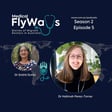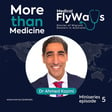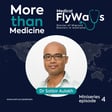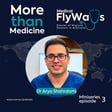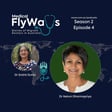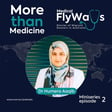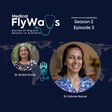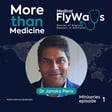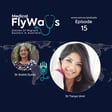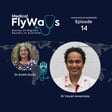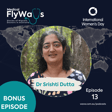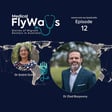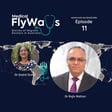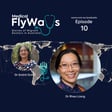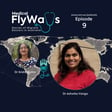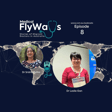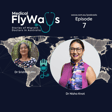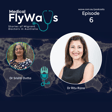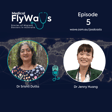Become a Creator today!Start creating today - Share your story with the world!
Start for free
00:00:00
00:00:01

Episode 18 - Dr Carmen Brown
Dr Carmen Brown is a board-certified obstetrician/gynaecologist with qualifications in Australia, New Zealand, and the United States. After completing her medical training in the U.S. in 2004, Dr Brown gained extensive experience working with prominent private practices before relocating abroad.In 2010, Dr Brown and her family moved to rural New Zealand, where she served the community for four years. Following the birth of her son, she settled in Australia and has since worked as a public consultant across metropolitan Melbourne and regional Victoria.With over a decade of specialized experience, Dr Brown focuses on menopause symptom management, offering evidence-based care tailored to each patient’s needs. She stays up to date on the latest advancements in treatment, providing a comprehensive range of options—from holistic, exercise-based, and mind-body approaches to non-hormonal and hormonal therapies.A passionate advocate for health literacy, Dr Brown empowers women to understand their health and explore options for managing menopause effectively. She is a dedicated member of the Australasian Menopause Society and the International Menopause Society.
Recommended
Transcript
Introduction to Dr. Carmen Brown
00:00:01
Speaker
Medical Flyways, the untold journeys of migrant doctors in Australia.
00:00:13
Speaker
Hello, thank you for joining us, Carmen. Today I'm very lucky indeed to have Dr. Carmen Brown with me. She is an obstetric and gynecology specialist and has a sub-interest in menopause and currently works in Victoria.
00:00:28
Speaker
ah But in her journeys has lived and worked in three different countries. has continued to follow her passion for her specialty and not deviated from it, and is now also the clinical director for a service which she has taken on with great gusto with a view to introducing change. So welcome, Carmen. Thank Thank you so much for having me I'm so glad we finally got together.
00:00:52
Speaker
Yes, we did. We've been planning this for a while and with busy lives, it can be a bit of a challenge to nail the timing, etc. and so we've actually over time interacted on social media, I think, a few times as well. So mainly in medical, you know, medical doctors groups. Yes. Would you like to add any more? Because ah what I know about you is mainly through social media or what's available publicly in terms of your journey.
00:01:17
Speaker
Would you like to tell us a bit more about your journey? Sure.
Career Transitions and Burnout
00:01:20
Speaker
So, like you said, I am an obstetric and gynecologic consultant. I started my journey in the United States. I did all my training there and and did private practice there for several years, I think about seven years as a consultant, and then Decided I needed a change in my life and my career and packed up my life and moved to New Zealand and worked in New Zealand as a consultant for several years and really enjoyed the complete different perspective from healthcare being in New Zealand.
00:01:51
Speaker
And then I moved to Australia nine years ago. I'm still like, I'm boggled every time I think about the time. I'm like, how is this possible? I've been gone that long, but I have. So I've nine years now in Australia and now working and living here, loving it. And if someone asked me, you know, 20, 30 years ago, you know, do you so see yourself living overseas or you know, having some kind of major job overseas. I'm like, absolutely not. But ah here I am. So I'm a clinical director at my hospital now, which is amazing. And I do some menopause work, specifically menopause and perimenopause work. So I'm really enjoying that.
00:02:26
Speaker
Awesome. Now, you make the move sound like it was, what should I say, a bit of a surprise to you. I'm just wondering what happened because there's so many different reasons why people choose to make that big decision in terms of their life and career.
00:02:40
Speaker
What do you think were the pull and push factors for you? Honestly, and I'm always very like transparent about this, I was burnt out. There was a point in my career that I can honestly say that I...
00:02:52
Speaker
was trying to figure out how to get out.
Moving for Family and Work-Life Balance
00:02:54
Speaker
And what scared me about that is that I was ah relatively junior consultant. I think, you know, i I guess within five years, you're considered junior. So I was like maybe five, six, seven years out of training. And I was like, I cannot do this for the rest of my life.
00:03:08
Speaker
So I'm panicking because everything in my life up into that point was me like, you know, really trying to get into training and, you know, trying to, you know, reach those levels so that you can be a consultant. And I had reached that and I found that I was completely and utterly just broken.
00:03:25
Speaker
And i literally happened to talk to a American GP that was living in New Zealand when we were on a trip. And she was like, you know, you don't really have to do that. You don't have to work like that.
00:03:41
Speaker
And said, you know, maybe you can consider doing something different. And said, you know, I'm in New Zealand. I love it. And maybe you should consider that too. And at that point, I was literally thinking, what else could I do with my life?
00:03:52
Speaker
even though i had dedicated like 15 odd years to becoming a consultant. And it just seemed to me like it clicked. I was like, oh my God, I have a skill that I could, you know, move somewhere else. And so my husband and I, thank goodness he's on the same page. We were like, yeah, let's pack it all up.
00:04:08
Speaker
moved to New Zealand. but So it was actually a really kind of traumatic point in my career where I was burnt out and thinking about leaving medicine completely. and And, you know, that sounds, it is undoubtedly something that there'll be others out there who might relate to, but whether that's in terms of a career move or a continent move or whatever else that might be, a kind of a bit of a big shift What are the things do you think that you changed alongside the move? Like, to me, it sounds like there were things other than where you were that were bothersome.
00:04:41
Speaker
Yes, you're right. It wasn't just one thing. I think when I talk to people and talk to them about my experience with the move and what why I moved. I always explain to people, I'm not trying to convince you to leave. I'm not trying to tell you and sell you that, you know, your life is crap and you should leave.
00:04:58
Speaker
For me, it was several pieces of the puzzle. For me, working as a physician in the U.S. system seemed unsustainable and untenable to me. And also, there were societal things about living and working in the United States that made it, you know, something that i really wanted different. At that point, I'd had my son and I just, I couldn't imagine, you know, active shooter drills for him at school and not allowing him to have the type of upbringing that I did where I felt like I had a little bit more freedom, even though I probably wasn't safe, but I just, I just could not see that for him and I wanted something different. So I had two different areas in life. I had, you know, the personal and family aspect prompting me that I wanted something different.
00:05:45
Speaker
And then I had the professional aspect saying that I just could not do this long term. ah Yeah. No, I think that you're probably right in that. I don't know that many of us can relate to that description of what you thought your son's life would be like in anywhere where we are.
00:06:00
Speaker
Do you feel like it's been a positive move in both those regards? And can you think of, keep keeping in mind what timeframe we're thinking of, I'm more thinking about, you know, what is it that you see in your kids that makes it feel like that rather than, you know, all the other objective milestones and goals we set ourselves?
00:06:18
Speaker
Yeah. Do you feel it's been a positive move overall? Absolutely. i I can't imagine anything different. And i I literally am so grateful for the changes that I made and the opportunities that given him. Because i think for if there's any American listeners, they would understand. Like for me, this feels like living 50 or 60 years ago in the United States. And that's not to be, you know, disrespectful to the people of Australia or New Zealand, but it's actually a very huge, like, thank you and gratitude thing is that
00:06:50
Speaker
You know, my child is safe. He can go out and play with his friends, and I don't have to worry about him being injured or kidnapped or shot. And I'm not saying that, of course, the entire United States is dangerous per se, but we all know that it's a much larger country, and there is a lot more aspects that we have to worry about with our children. And I just feel that it just seems like a much more laid-back lifestyle, much more neighborly type of feel that I have here.
00:07:19
Speaker
and I just... don't think I could have gotten that in the same way in the United States. And I'm totally happy for other people to say, you're wrong. And I live in a small town and you know wherever America, and I feel the same way. That's wonderful. And that's great.
00:07:35
Speaker
But I think for me, for those two aspects that are critical work and home, I was able to check both boxes. And for me, that was moving overseas. Yeah, and and so given you've had the experience of both New Zealand and ah and Australia,
Cultural Experiences in New Zealand and Australia
00:07:50
Speaker
and from what I gather, you worked rurally in New Zealand as well. I did Do you feel it's more about community or?
00:07:57
Speaker
Absolutely. It is a very, I'm rural now. I've been rural since even right before I left the United States. And for my family, it speaks to us. We really like that community aspect. I like everyone knowing everyone and having that that belief that we have to take care of each other.
00:08:14
Speaker
It could just be my, you know, starry-eyed, I used to love watching Little House on the Prairie. It could be that. But, you know, i I love it. I love the fact that, you know, everyone at the coffee shop knows me, that everyone knows my kid, and we still have that belief that we take care of each other. We're neighbors.
00:08:30
Speaker
I really enjoy that part. And so, yes, I totally feel that there is still that belief that there is a community, there's a neighborhood, and we owe each other a level of decorum, comfort, safety. Yeah, I like that part of this.
00:08:45
Speaker
So what was New Zealand like? Because that would have been your first experience of it. Are there any stories that come to mind or anything that sticks out? as Oh, gosh, yes. Yes. I it's so it's funny. I swear one day I think I would try to write a book, but I just think it was so jarring because i went from, you know, I went from a rural place in the United States to a rural place in New Zealand, but they're still very, very different.
00:09:09
Speaker
And I remember when I was in gynecology clinic and one of the post-operative instructions that we would give our patients after having major surgery is not to pick up sheep or calves.
00:09:21
Speaker
And I was like, and what am I saying right now? And it was just so bizarre to me that I'm giving people, like, these are, you know, farm women and these are, you know, women that like work on dairy farms and stuff. And I'm like, it's really important. Don't pick up a sheep for six to 12 weeks after your hysterectomy. So,
00:09:38
Speaker
It was a very, very huge cultural shift because I think there's a very big difference when you talk about rurality, right? There's you know rural just because it's you know farther away from a city center, but then there's actual rural places where it's truly an agrarian lifestyle. These are people that work on farms and you know that type of thing. And so that's what I was in. i went from rural just because it's far away from a city in America, right?
00:10:02
Speaker
But this was actually rural where everybody in my town works for a farm, with a farm, adjacent to a farm. Somebody is a farmer or, you know, that kind of thing. So it's a very, very different situation for us.
00:10:15
Speaker
I think it's not just proximity that defines it. You're right. And, and you know, I trained in a part of the UK that was... technically classed as semi-rural, but we had a massive, huge supermarket and we were about 45 minutes away from a big city. like so snow you know So, yeah, I do agree. that's New Zealand, have not necessarily worked in, but visited. So that sounds quite interesting in that regard.
00:10:39
Speaker
So from a personal point of view, i can share that my first time in Australia was in a place in North Brisbane that the Australians would definitely have heard of. It's called Kaboolture, which is ah which an interesting place. It has a big hospital.
00:10:54
Speaker
And I remember going with my then four-year-old, I think, just to get some groceries. And that and this was in the middle of summer, so December. and then we're going in there and I can see people walking around without any footwear on. Yeah. Yeah. I was quite struck and I was like, I've either missed something or I shouldn't actually be here in in that should I be at this shopping center. But yep.
00:11:17
Speaker
So you know you get to see what it's like and it slowly seeps into you in terms of what you're prepared to accept and what you observe and don't take on. Yes, you just change your whole thought. you know Like you said, it's jarring initially.
00:11:31
Speaker
And then you like, you know, you're just like, yeah, whatever. It's normal. we We had a sign at one of our, quote, nice restaurants in the town I lived in that said, please take off muddy boots at the entrance. day go So like all the farmers would take off their gum boots when they come in. So you have people at the restaurant with socks on.
00:11:48
Speaker
It's just like, what is going on? So fun things that we observe. And so, yes, it was it was interesting. And i think my daughter might even have asked me about it and gone, why do they not have slippers? Because her frame was India where they didn't have slippers because they couldn't buy them as well. as so So quite a different frame. So now in terms of kids, do you think there's any particular things they really enjoy here?
00:12:13
Speaker
as compared to the US or other aspects of either that you feel that they have adopted? That makes them as Aussie as they are, I suppose, as Oh yeah, oh yeah.
00:12:25
Speaker
So we're we're very lucky. I live in a beach town and as you know, probably what is it, like 85% of Australians live within a certain kilometers from a beach. So as the typical Australian, we live very, very close to a beach. So super lucky.
00:12:40
Speaker
And this year, my son started Nippers, which is, as you know, like surfing, life-saving for the younger ones. And it's, for me... I was sitting there awestruck because I'm from a town, I'm from a city in the United States. There was absolutely no water near us. And so I know nothing about beaches, surfing, any of those things at all. And so I'm sitting there watching my kids surf and I'm like, this is bizarre.
00:13:07
Speaker
But it's amazing. Like he's in this culture that's very different from anything I've experienced. And this is going to be his life, his upbringing, right? This is going to be his formative memories, that it's always around water. And he does these kind of beachy, surfy things. And yeah, it's like a very outdoors type of, I think, kind of focus, I feel, at least in rural Australia. So everyone you know plays footy or they go outside and hike and walk and bike.
00:13:34
Speaker
And it it just seems so... natural. And I love that. Like it absolutely makes me so happy to say, you know, oh, you know, he's outside on a hike somewhere, you know, kind of thing. And that's just totally normal. it's not something that we had to plan as a family. It's just normal Saturday afternoon, two hour hike, you know, just go outside. and Yep. And i I do think that, you know, in terms of other countries, I do think that makes a difference because the weather is good enough to be doing it and everyone's doing it. So you don't feel like it's an extra, you know, extra planning involved.
00:14:04
Speaker
Is there anything you've picked up since coming over that you'd consider? I did. I did. I picked up paddle boarding, which is once again, bizarre because I never, that i didn't know what that was. Never heard of it until I would say probably after I've moved over to Australia, didn't know what that was.
00:14:21
Speaker
And I saw it one day. i was like, that looks really easy. Well, it's not. It's not. um But I picked it up last year. And there's also a women's surf club that I said starting this year I was going to try to um get into.
00:14:39
Speaker
But I figured that would be like a really exciting random thing for me to do. But, yeah, I picked up some very weird things. I love um hiking now, which I never ever considered before any time in my life, but I love going on walks and hikes.
00:14:54
Speaker
It's just like you said, it's like something about the culture here that makes it norm the norm. And this is what you do. It's like, yeah, of course you hike. Of course you camp. Of course you paddleboard and surf and dty these types of things.
00:15:06
Speaker
Yeah, no, if you camp, like my kids have occasionally camped outdoors. And I remember once my mom called and I said, she said, where are the kids? And I'm like, they're in the tent outside. And said, what do you mean? I'm like, oh, they just hitched the tent in the backyard.
00:15:17
Speaker
Yes. Are they planning to sleep there? um Yes, mom. It's the Easter holidays. Okay. What about the snakes? I'm like, hmm. I'm like, okay, we're not going to work this all out overnight.
00:15:28
Speaker
And I don't expect snakes, but this is what they do here. Exactly. night It is fine. They didn't have any snakes come up and say hello to them. So, yeah. ah and Now, in terms of the actual moves, in terms of profession, do you recollect any particular, I guess, enablers or barriers in terms of the move from the U.S.?
00:15:49
Speaker
guess New Zealand and Australia are much more aligned in some regards, but coming from the US, it's a different... and My perspective is I know of things from the opposite end, of in terms of all my colleagues from my Indian university that went over to the US and the USMLE and exams, etc.
00:16:07
Speaker
What was that like for you moving from there?
Challenges of Practicing Medicine Abroad
00:16:10
Speaker
I would say it's really difficult um because i think it's because of the timing. I think when I made my move, there weren't a lot of Americans looking to do something similar. So I think around the time I moved to New Zealand, there were literally a handful of us from America that were in New Zealand and even less so in Australia.
00:16:29
Speaker
And because, of course, as you know, we share colleges in most cases. So particularly ONG colleges shared between Australia and New Zealand. I know that GP is one of the ones that has like individual colleges, but I went through the process and I had no guidance, no one to help, no nothing. It was just me online trying to figure out how to get registered, how to work, and those types of things. So it was really difficult trying to figure out how I could fit in And then there are a huge number of differences between practice, between the three countries, which is really interesting.
00:17:04
Speaker
In hindsight, if I were to tell someone what would be the, quote, easiest way to understand the systems and work within the systems coming from the United States, I would actually have gone backwards. would have gone United States, Australia, and then New Zealand, and not the way I went, because New Zealand is so incredibly different from Australia, then Australia is different from America. And so it was really a culture shock for me coming from America to New Zealand, but then even a little bit of a shock going from New Zealand to Australia. So there's, yeah, it was very interesting. I didn't have a lot of of help to figure out how to navigate the system and how to assimilate into the system. And I think that
00:17:44
Speaker
It's one of the issues that I found that has gotten better over the last 10, 15 years almost since I've been here, that I do feel like the colleges have done a lot better for us international medical graduates, or SIMGs as we're called. But back then, wasn't really that good.
00:18:04
Speaker
So how did you figure out where you were going in the in terms of the nitty-gritty of which hospital or which service? Because you know I guess, as you said, there's the practical things and then there's the assimilation.
00:18:16
Speaker
If you're coming as an ONG who's already board certified, I would imagine... I'm making an assumption here, but from a skills and knowledge perspective, they expect you to, you know, hit the ground and get started day one and be the expert in the room.
00:18:30
Speaker
But there's, when I try and describe things in that framework for my fellow, or you know, if I'm describing it for someone, I'm like, you know, there's knowledge and skills, then there's system literacy, then there's cultural literacy, and then there's your local nuances that you've got to figure out. Yes, yes. What were the things that stand out for you that you think if it happened today, you'd already have known about it?
00:18:54
Speaker
I think you brought up something that's really good. You literally broke it down perfectly because there are nuances on each level, right? So you have, you know, you're coming to New Zealand. This is a New Zealand health care system. But now you're coming to a small rural hospital.
00:19:07
Speaker
on the South Island of New Zealand. So this is another nuance or a layer that you have to it. Oh, and then by the way, you're going to this one particular hospital. And so it's it's so layered and so very different. So Interesting enough, when I came, I literally just put my hand up for a job because remember, I was desperate. I just wanted to get out. And so for me, New Zealand was this monolith.
00:19:28
Speaker
And that's a very ignorant way of thinking, I will admit now. I just thought New Zealand is just like one thing. But obviously, it's very, very different. And so I ended up in a very, very rural town. Not rural, but it's a regional town, but it's on the South Island. It was on the South Island. And so that right there is a huge difference. And I didn't realize there's a cultural aspect to that. So people in North Island feel a certain way about South Islanders, and then they feel a certain way about people who live on the bottom of the South Island. And so was all these little layers, of course, I wasn't privy to.
00:20:02
Speaker
And then i just, I didn't really understand that part. And there was no one really to kind of explain that to me. So I had to like, you know, learn on the job, you know, learn on the run. Like, you know I didn't know people from Auckland felt that they were a little bit better than everybody else, or at least that's what the thought process was. And so I'm like learning this stuff.
00:20:19
Speaker
And then you put the extra layer onto that about the Pacifica patients and the the minority groups that are in New Zealand. And so I did know about that. I do give them credit. They they did give us some um cultural cultural training about am Maori and Pacifica peoples.
00:20:36
Speaker
So I did get that. So I felt a little bit more grounded in that, but I still learned more on the job about things I need to know about my Maori patients and things I need to know about my Pacifica patients. And so it was really, it was Yeah, it was so much to learn. And I think because I'm a nerd, I loved it. And I just felt like a sponge and I'm absorbing it all. And i'm like, this is so exciting. But I can imagine how it could be very overwhelming. Yeah, if you're an old, you know, grizzled consultant, you're like, I'm not at the space or time in my head to be like learning about, you know, X, Y, and Z or whatever. I'm sure it can be very difficult. And quite honestly, I did see some consultants from other countries that came over and they were not happy.
00:21:18
Speaker
because it wasn't in their box and the way they had been trained and learned. And so for them, this was either barbaric or it's not the way we do it in Germany or, you know, so it can go wrong depending on, I think,
00:21:33
Speaker
what you're open to like experience and and learn. You're absolutely right. There is a certain inherent level of openness needed to kind of just come in and then build your knowledge of all of those things from scratch.
00:21:45
Speaker
So
Building Connections in a Multicultural Setting
00:21:46
Speaker
you've done that twice and moved to Australia and done it all over again. i like i'm I'm actually thinking of my experience and there are certain things I've found that tend to make it easier in terms of the everyday. So, you know, if you're somebody who's planning to come and listening and going, what can I find out about this? So, you know, in Australia, it's usually the footy.
00:22:06
Speaker
So what was your experience of things that connect people, you know, like even as a doctor, when you're you know, sitting with women particularly in these vulnerable situations, what do you think you find that doesn't really matter where you're from, but you can connect with people on, you know, what are the things you find that are helpful in that regard?
00:22:26
Speaker
I think family, kids and community are the things that kind of like will ground everyone and give us that commonality. One of the things that a lot of my patients will know is that I'm very open. i have a son with special needs and He goes to our local specialist school. And so one of the things I make sure that my patients understand is that not only am I your consultant, but I'm also a mom and I'm a mom of a special needs child. And so i think when they kind of realize like, oh, well, we have something in common. Oh, I have two kids or I have this or, you know, or my friend works at the specialist school or something of that nature.
00:22:59
Speaker
i think that that really kind of brings us together and nothing against my friends and consultants that don't live in our area But I'm very, very lucky that I live in my community that i where I work.
00:23:13
Speaker
And so I think that brings a whole other level of commonality when I talk to my patients. Because I think they come in and they just assume I'm one of those fly-in, fly-out doctors. And that as you know, in Australia, that's what a lot of us do because a lot of these places are really rural, really regional, and very hard to get into.
00:23:30
Speaker
And it's not anything against the community. It's just that sometimes you have a partner that has a job that's not in that community. And not everybody is lucky where they have a partner that might be at home or something of that nature. So you can't live in these smaller communities, but you really want to help and you want to go there.
00:23:46
Speaker
So I think a lot of patients just assume that you're a fly-in, fly-out or drive-in, drive-out doctor. And so I think when I come in, I'm like, oh, yeah, well, you know, i was at the IGA the other day and blah, blah And they're like, oh you live here?
00:23:58
Speaker
I'm like, yeah, of course. You know, you know my kid goes to school. And then all of a sudden that barrier's dropped and they're like, oh, we have something that we're similar. and you know So but it bridges the gap, I think. Yes. I mean, I guess it's also, there's a certain amount of effort required from both ends to establish that kind of relationship. So they must have had the experience of having done it over and over again, possibly. So they're they're kind of investing in you as you are in them.
00:24:24
Speaker
So it makes a difference. In terms of, I know that when I spoke to Nisha, I think we were talking about how being a a doctor and being a member of a representative community or a minority community, are there different expectations from you in that regard? Or do you find it doesn't make a difference in terms of your professional world and work?
00:24:48
Speaker
I think it does in a certain way, but I also understand the privilege that I have. I understand that when you're coming from Western-speaking country, so those of us from like the UK, Canada, Ireland, those types of things, I think that that is one barrier that you don't have to hurdle.
00:25:10
Speaker
And I realize that's a place of privilege. So I think that has actually afforded me some benefit. But also, you still have to deal with, of course, the usual...
00:25:21
Speaker
unfortunate expectations and thoughts about, you know, where you're from and like, oh, you know, you know, you obviously are fleeing gun violence because, you know, you're ah Black woman from America. I'm like, eh, not really. But, you know, but that's, you know, that's what you kind of think. yeah.
00:25:38
Speaker
You know, you're trying to break down those stereotypes. Exactly. And I think that's the other big thing is is that I'm hoping that that's what I'm doing. I'm laying a foundation and breaking those stereotypes because I want them to be able to go home and say, well, actually, i have this American doctor. Oh, and by the way, she's black and she's not gotten shot. You know what I'm We didn't share those stories. There's none to share.
00:26:02
Speaker
know. Like, yeah. So, yeah, that's helpful. Yeah. It is interesting. them when I was in the UK, which is surprisingly got a so sizable South Asian population, but I worked in an area which was not that diverse. And I still remember being asked about if I was married or not, because I i would often take off my ring,
00:26:23
Speaker
um ah you know Some of us will feel like that's too intrusive a question, but when you're in ah you know you live in that community, there is a certain level of familiarity that's expected. And it so happened that then this purely and this was curiosity because I could gauge from what they were saying that they were trying to, in their way, make that connection and going, you know, I've seen women, they wear this red thing on their forehead. Yeah.
00:26:45
Speaker
How come you don't wear that? And I said, that was quite interesting. I'd never actually been asked by anyone else, ah even from my own community, that question. so I said, oh, that's a good point. I don't actually wear it. I don't have never thought about why I don't wear it. Probably it's because one more thing I'd have to remember first thing in the morning.
00:27:05
Speaker
ah So, yeah, it is it is quite an interesting one. You're right, we have to balance that. How do you then make sure that your son has a good exposure or experience of the cultures he belongs to? Oh, that's a good question. that's that That's been a bit harder since we moved away from Melbourne. So, when I first moved to Australia in 2016, we were living in Melbourne and I was doing one of the drive-in, drive-outs to a ah regional hospital.
00:27:33
Speaker
So I was driving one hour, one way every single day to work and back. But my son was in the city, my family was in the city, and we did that specifically because he had services that we were trying to get him. So he needed OT and PT and speech and that kind of thing.
00:27:49
Speaker
And as you know, you can't get those very easily in rural and regional towns. So we were very lucky that we were able to base in Melbourne. And when we were in Melbourne, as some people might know, it's a very diverse city.
00:28:01
Speaker
I think a lot of people don't think that when they think about Australia, but Melbourne, Sydney, Brisbane, all of them have a significant amount of diversity. And Melbourne is a really diversity in that it also has a very large African population.
00:28:16
Speaker
And believe or not, I've found some African-Americans there too. So having him be able to see people that looks like him, I think was really nice. Those early formative years, having friends and things like that. But now I am out where we are.
00:28:31
Speaker
he doesn't see anyone at all that looks like him, which I don't think is detrimental. And I think the reason why that is, is because I once again, go back to that kind of community. I feel like people think that he just belongs, like we just belong and we feel very supported.
00:28:49
Speaker
So there are other reasons for him to belong there. Not just that one, one thing that separates him. Exactly. It's not just based on the fact of where he came from and necessarily the color of his skin, is that he has that belonging with his mates and his friends and his school and the community.
00:29:04
Speaker
So, of course, we do we have books in here talking about you know great African-American heroes, and we you know we talk about things, but I don't really think I'm doing him a disservice, per se, by not having him constantly surrounded by other black or brown people. So that's just my thought.
00:29:22
Speaker
I'm sure somebody may think differently, but you know, my kid, my kid, my choice. Absolutely. But I think it is interesting because um I'm not sure how much my kids would like me sharing things here, but...
00:29:34
Speaker
But there, because my two have had different experiences. One was born in the UK and came over here and started primary school. And so we were chatting one day and she's actually in her formative years had had quite a few moves.
00:29:48
Speaker
Whereas my younger one pretty much was born in this community and has lived in this community. So her her sense of belonging comes from a different set of thoughts, experiences and life events.
00:30:02
Speaker
So you're right, you have to acknowledge that for that individual, you know, child that you have and what that means for them. So I've had so many different stories that people have told me about, you know, someone might tell me about an incident where they were, you know, they found someone in the school that was someone they could relate to and that welcomed them into a community community.
00:30:22
Speaker
I met someone socially at a 50th birthday party, and they commented on how when they moved from South Africa to Brisbane, and they had come to their first parent evening, I believe, and was a group of other immigrants, let's say, migrants, who just simply went up to them and said hello and said, hey, you know, we're all new to this city as well, you know, do you want to join us on that table? So, you What is that first step of a greeting or inclusion or what what what what is your experience of that in terms of the community? What was that like for you?
00:30:57
Speaker
I think you're very right. I think when I first got here, I had i literally had just by mistake meeting people. I think you know just out and about, I had met some really lovely like American people that heard my accent when I was at a market they're like, oh, how are you doing?
00:31:11
Speaker
Strike up conversations and next thing you know, they're inviting you for tea. but also the the community as far as in medicine. So some of my extraordinarily good friends are people that I met through work. And we share the fact that we're all you know immigrant doctors to Australia And we come from different places. Most everyone is either from the UK or, you know, overseas, some kind of a South Africa, UK, that kind of thing. But we have that bond and that, you know, this is not necessarily our necessari home training country and that we've gone through different experiences to get here. And so having those friendships and that bonding, even though we have zero in common, but we do have that one aspect is we're migrants here. We're working in the system
00:31:56
Speaker
And we want to actually serve the community in that we you know we live and work. And so it's it's been good. I
Cultural Humility in Medical Practice
00:32:01
Speaker
have some really, really good friends here. People actually say that I i love. you know These are people that I would be like, I'll leave my kid with you if I'm in an accident, you know, type of thing. Absolutely.
00:32:11
Speaker
And if you had to think back to when you came here. I know you mentioned about the move from US to New Zealand, New Zealand to Australia. Can you name, and I'm going to put you on the spot here, but three things that, you know, you would pass on to someone who's considering that right now. Three three things about mindset, about learning, about whatever you feel is really important that they need to consider, but because there's no perfect formula for anyone.
00:32:38
Speaker
But what do you think are the key ingredients of that recipe? Yeah. Well, I'm not sure about the three, but I know number one is having an open mind. and It sounds very you know trite and ridiculous, but truly I've actually seen people fail because they're not willing to open their minds to something that's different from their prior experience and where they might sit and tell people, well, i absolutely hate it there because they don't do this like we do back home.
00:33:06
Speaker
And the thing is, is what do they say when in Rome, you know, do as the Romans do? that That's what you have to do. You literally have to come in with that mindset that I'm coming to someone's country. I'm going to learn the culture and how things are done here.
00:33:17
Speaker
And you will fail if you do not have that mindset. That's just all there is to it. you're not going to come over here and change them to the British way. This is just not going happen, even though, you know, we know this is a commonwealth. But still, you see, like, it's very still different from what you might have done in the UK and London than what they're going to be willing to do in Brisbane or in Sydney. And so kind of being able to give that up and respect where you are and the culture and the the guidelines and policies and things that we have in place and learning that.
00:33:48
Speaker
I think the other thing is, is that you should do your research. The second thing is, is you really do your research. I, because I'm a nerd and I like to get online and look stuff up and read about things, I feel that that was also extraordinarily and important preparation for me.
00:34:02
Speaker
Even though I didn't really know a lot about the town I ended up in in New Zealand, I still knew enough about like, you know, i'm looking up, you know, the area and what the main, you know, culture is and, you know, the GDP and how dairy farming is really, I knew that bit. I might not have known a dairy farmer at that point, but I did the research so that it wouldn't be so much of a culture shock and not understanding the community in that I've landed in So I think that was, I think, another important piece that think sometimes we're a little bit jaded, but especially when you're coming from a bigger place to a smaller place, right? So pretty much everybody is coming from somewhere bigger, whether it be Canada, the UK, or whatever, you're coming to these tiny little places,
00:34:42
Speaker
And I think you just kind of feel like, well, i don't need to learn about them. I'm coming, you know, and I'll just figure it out later. What you're saying is a certain level of cultural and professional humility ah almost.
00:34:53
Speaker
Yes, you really have to have that. And I unfortunately think that Especially, I think, just because of the types of personalities that we get. okay That some of us are not really willing to yield and learn differently. So I think that that is why you might have a really negative experience or setup.
00:35:16
Speaker
And I guess and the last thing I think is that home is literally where you are and where you make it. So, you know, i people ask me, don't you miss home? And I kind of like, but I am home. You know, like I would have never thought in a million years i would have been Australian citizen and that I would have been here almost 10 years and then I have a child that sounds more Aussie than American. Never would have thought that.
00:35:39
Speaker
But for me, this is exactly where I want to be in my home. And I couldn't imagine going back to what my home was because this is me now. And I've kind of made that change now.
00:35:51
Speaker
And we settled here and made the conscious decision that this is going to be our home. And so I think that you have to change that mindset instead of always anchoring yourself somewhere else. You'll never feel whole if you do that.
00:36:03
Speaker
If you always think that my one foot is, you know, in the United States, but my other foot is here, you'll never feel whole or settled. And so we made the decision to jump in both feet.
00:36:14
Speaker
Awesome. Yeah, no, I completely agree with you. It's the longer you make... I guess the letting go of that is not easy for everyone. And some people take longer to do it. But until you do it, you kind of feel split between places. Right.
00:36:28
Speaker
And some people can't, and that's okay. Like, there's nothing wrong with... you know, saying, well, that's not for me. And like I tell people that ask me about their, you know, moving and should they, and I can't encourage you to do it. You have to do it for yourself. Like you have to make that decision and be okay with every aspect of it.
00:36:46
Speaker
And for us, totally fine, it worked, but it might not work for everybody. So have you mentored anyone to come over is my next question. Sounds like you've spoken to a few people. i do.
00:36:57
Speaker
I have a consulting company that I started years ago for that reason only. It's actually, always give my husband credit because he was so annoyed that I would get these random Facebook messages and phone calls in the middle of the night. And I would literally be talking to some random person in the United States at two o'clock in the morning telling them about what they needed to do move to Australia, New Zealand.
00:37:19
Speaker
So I ended up putting all that knowledge in a book and wrote it down. And I literally thought that was the silliest thing ever, but my husband was like, write it down, write it down. like, okay, I'll write it down. And then I just started kind of consulting after that. So I try to help people understand in that area that I didn't have any help. Like, I'm just like sitting there like, how do I get to New Zealand? And I try to make sure that people understand there's a really streamlined pathway, but you have to have your ducks in a row.
00:37:43
Speaker
And then once again, making sure that they understand that you have to want to do this for multiple reasons and not necessarily just one. so that you could be successful. And for a lot of people, it doesn't go anywhere. You know, we have a consultation, they're just like, I can't do I'm like, okay, that's all right.
00:37:57
Speaker
That was a decision they needed to get to after the consultation. Oh, that's amazing. I mean, look, I certainly know of people who've, you know, formally got into recruitment, but I think your your way of giving back sounds incredibly positive. And um i yeah, I suspect my other half would agree with your other half, but...
00:38:17
Speaker
yeah ah So do you feel that in terms of being a woman and and kind of your particular area of special interest, it kind of pings my brain in so many ways, is female doctor, i guess woman of color, if we want to add that to that apparent successful medical career. What does life look like in in this window?
00:38:41
Speaker
i.e. mid-career, let's call it, not going to give you a diet, you know, were life changes that are menopause or not menopause. What are you doing that keeps you well, keeps you motivated, keeps you whole, as you said earlier? and
Health Scare and Life Balance
00:38:57
Speaker
Yes, yes.
00:38:58
Speaker
So I had some significant challenges in the last couple of years, as we talked about earlier. so I had a brain aneurysm two and a half years ago, and it was diagnosed by mistake. So I'm very lucky. I didn't have any symptoms. I'm like literally lucky it was found.
00:39:13
Speaker
And then had a craniotomy. And that was very, very eye-opening because, first of all, never thought I would be on that super side of the table where like, you know, neurosurgeons and things like that.
00:39:26
Speaker
But I also did not realize how much healing takes, you know? you You tell your patients, hey, you know, you're going to be off of work for six weeks with your hysterectomy and, you know, don't lift heavy things like sheep or lamb.
00:39:39
Speaker
And, um you know, you give them those instructions, but the brain is such a weird place. And i can't believe that, you know, you go through this brain surgery and you don't have any pain, really don't have any pain, but the actual symptoms that affect you later can have a complete change on your entire life.
00:39:57
Speaker
And that's what I think I was caught off guard with. I did not realize that the healing and recovery would take as long as it did. And it took forever, like ever. I was out of work for four months, went back probably too soon because I was just like, ah, this is hard.
00:40:14
Speaker
And then did not get back to a level of pre-Carmen for at least probably about a year after the surgery because of fatigue and those types of things. So I had to really like bring it all back in instead of saying, you know, oh, you know at that point in my life, I was thinking, you know,
00:40:30
Speaker
You know, in my 50s, I'm about to be in my 50s and I'm starting to look in like, oh, let's increase the career and then we're going to go back down as you reach in your 60s. But all of a sudden the brain surgeon is like, actually, you're to be 60 now.
00:40:43
Speaker
like We just jumped the middle 10 years for you and welcome to your 60s. There you go. And then you it then you you hit menopause on top of that. Just like, awesome. So I had to say, you know what? I have to make sure that I pull back and take the time for family and me.
00:40:58
Speaker
And i had to strip it all back. So I stopped doing so many things that I thought I was going to be ramping up. Consulting is one of them. And you know i had a private practice that was in the suburbs of Melbourne. had to close that.
00:41:10
Speaker
So everything had to be totally stripped back. And I had to think about what is going to make me calm down and focus. And so for me, i like to walk. I like to walk on the beach. Oh my God, it's so beautiful.
00:41:22
Speaker
Anything that has green and ocean or something like that involved. So I do these beautiful walks where there's no headphones, Nothing I'm listening to is just me quiet and walking type of thing. And for me, that's a centering.
00:41:33
Speaker
I just, yeah, it just, it it changed a lot. I still don't think I know exactly. I'm not really sure. i have an idea of exactly how I'm heading, but I think that I am going to focus more on working in the healthcare system, but more in administrative kind of role Because I know now that my body's not the same as it was two and a half years ago before the brain surgery. So I'm taking that into consideration and looking at how I can still use my experience and my talents, but not kill my body. frozen Because it's 16 now. Sounds like medicine, though, when you describe it like that.
00:42:11
Speaker
Anyone considering a career in medicine. I mean, I have, i again, it's not, um i i I brought it up more because we all, and maybe, i it I've not decided whether it's a me or ah personality type thing or simply that to get through those early years in medicine, you just have to, I think you just blind yourself to any other. Yeah.
00:42:33
Speaker
You just put your head down. You just do it. You just put your head down and everything else will come later. And I think we take that for granted, right? You're going to later, I'll be able to take the time and do stuff with you know, my kids and I'll be able do this, but there might not be a later. Yeah, absolutely. So I do like, in and I think while, I think actually the the people that the next generation of doctors seem to find the idea of balance much more tempting than we did. So I'm hoping that, that I don't know if that's been your experience with your specialty.
00:43:04
Speaker
They seem a bit more clear, have a bit more clarity about that balance than, know, Or maybe maybe we did too. I don't know. Maybe underselling. No, we didn't. i I think kudos to them. You know, I remember that big bombshell that came out where they called the junior doctors marshmallows. And it was like, oh, like, oh my God. But you're right. I think that this generation, they really have it together. They understand. Well, look, there's limits on what I can do during the day.
00:43:32
Speaker
I still am trying to manage the fact that I might, you know, have a partner or children or outside activities, and this cannot be my entire whole being.
Evolving Work-Life Balance in Medicine
00:43:42
Speaker
And they get it. Whereas I guess with us, I'm assuming that, you know, I'm possibly older, but for those of us that came along, you know, 10, 15, 20 years ago,
00:43:52
Speaker
We just didn't have it. We were just like, you know you put your head down, you don't complain, and you just do it. And you're hoping that you'll get some kind of reward on the other side. In the meantime, you know we had relationships fall apart and you know maybe families that didn't really appreciate the fact that we put them on the back burner. And there's so many things that I think the new generation is totally getting.
00:44:13
Speaker
And I think that if we once again think outside the box, it doesn't have to be the way it was 20-something years ago when we were training. There can be ways that we can deliver good care and it doesn't have to be 80 hours in the hospital a week.
00:44:25
Speaker
Absolutely. And I'm hoping that with people like yourself in those leadership roles, that it may actually be possible and not be seen like ah some sort of anomaly in the system. Yes. yes back So, yeah, I mean, again, i'm I was discussing this with a with a colleague of mine who's my junior, and I just look at her and I quite marvel at how well she's able to be flexible, but at the same time, be clear about what the limits are in terms of that balance and I guess that's the part that occasionally gets me into trouble when I go, hmm, are they committed enough? And I'm like, yes, Rishi, they are. Just because they don't do the hours you did doesn't mean they aren't as committed as you are.
00:45:07
Speaker
so Right. And the thing that you have that introspection and you understand that, that i think that makes you a much better senior clinician, right? Because instead of being like the other senior clinician is like, this person sucks and they're not committed and they're a horrible doctor, we actually take the time to say, actually, you know what?
00:45:24
Speaker
I admire them for having the gumption to do that and say that. Like, I i could never, I can imagine as a junior consultant saying something like, oh, I'm not going to do that. You know, it just doesn't seem like you can do that.
00:45:37
Speaker
But the fact that they are and the fact that, like you said, I'm glad we have people like you that, you know, will support and say, actually, she is committed, but she's also committed to being, you know, a family member or a community person. Exactly.
00:45:49
Speaker
So I completely agree. Now, we we used have done this, what I call a rapid fire at the end of the session, which is three words, which I say, and you have to come back with whatever comes to mind.
00:46:02
Speaker
A thought, a word, your experience, whatever it might be. You do know I'm a menopausal woman. I might not be able to remember what. We'll have to find a good GP for you then. Come in. That's what we'll do.
00:46:14
Speaker
Okay. Okay. We'll try. So, first word, IMG. Oh, IMG. I think that's a loaded one, right? I think some of us do not like that terminology. That's international medical graduate.
00:46:26
Speaker
I work with the Rural Doctors of Australia, and I think we've been trying to change the name to Australian Doctor Trained Overseas. So, ADOTs. I kind of like that better because I think it also, it puts you, once again, Australia. That is where I work. That is where I want to serve. And these are the community and the people I want to take care of.
00:46:46
Speaker
So I'm Australian doctor first. So I actually like that. I don't think I like the IMG anymore. Awesome. And it is probably one I've heard from, don't know, this is me forgetting, you're the RDAA president. RT.
00:46:59
Speaker
RT. RT Lewandowski. I heard it from him first, so completely agree. I think that one might get more legs on it than any other versions I've heard so far. Yeah, I like it. I like it. Second word for you is mum. Oh, wow. That's hard one.
00:47:13
Speaker
Oh, gosh. I have an amazing mom. I'm so very lucky she's still with me. My mom is committed. And I think the thing is we're always thought made to think that motherhood is a selflessness. It's an act of selflessness.
00:47:27
Speaker
But I think, once again, we're now learning, new generation, is that you can't pour from an empty cup and you cannot be completely selfless. So I think for me, being a mom makes sure that not only do I keep him safe and secure and I'm there for him, but I also have to be there for myself because he's seeing me and watching me, and I don't want to provide him bad habits. Like if he sees me stressed and angry all the time, what is he going to think? What is he going to think about? What kind of remembrances is going to have of me in the future? so
00:48:00
Speaker
I think for me, it's not about being fully selfless, but it's being present for him and myself. Awesome. And the last one, which I have to add I've not used before, and it just felt right for you, is generosity.
00:48:13
Speaker
Oh, I think that goes back to the fact that you can't be overly generous. You have to be able to say no, but realize that doesn't mean that you're being rude or mean or you're not giving of yourself.
00:48:26
Speaker
but I think that some people think being generous means giving everything that you have and you can't. I want to be generous with my time, my experience, and I really enjoy it. It gives me something back, but I have to realize there is a limit on when I can and cannot give.
00:48:41
Speaker
So yeah, that's just me. Awesome. You know, I completely, like said, the words aren't pre-planned. They happen because of the conversation. And i I think I agree with you on that one. Generosity and sacrifice are two separate things and you can't get much too mixed up. so Yes, very much so. and I think people do, don't they? Yes, indeed.
00:48:58
Speaker
Yes. Now, this has been absolutely fantastic. I can't and thank you enough for the time. you've And it took us a while to land this one. It did. We got it done. Absolutely. So wishing you all the very best in terms of what comes ahead, whatever versions of Australian life can know bring along to you. But it's been a pleasure, Carmen. Thank you so much Thank you so much. I appreciate Thanks for having me.
00:49:22
Speaker
you. At Medical Flyways, we're always on the lookout for inspiring stories from migrant doctors in Australia. If you have a colleague whose stories need to be told, head to wave.com.au slash podcast.
00:49:38
Speaker
Medical Flyways is recorded on terrible land in Minjin, Brisbane. This podcast focuses on overseas doctors and their families finding a home in Australia.
00:49:50
Speaker
We acknowledge and thank the traditional custodians of country throughout Australia and recognise the continuing connection to lands, waters and community.
00:50:02
Speaker
We pay our respects to Aboriginal and Torres Strait Islander cultures and to Elders past, present and emerging.
